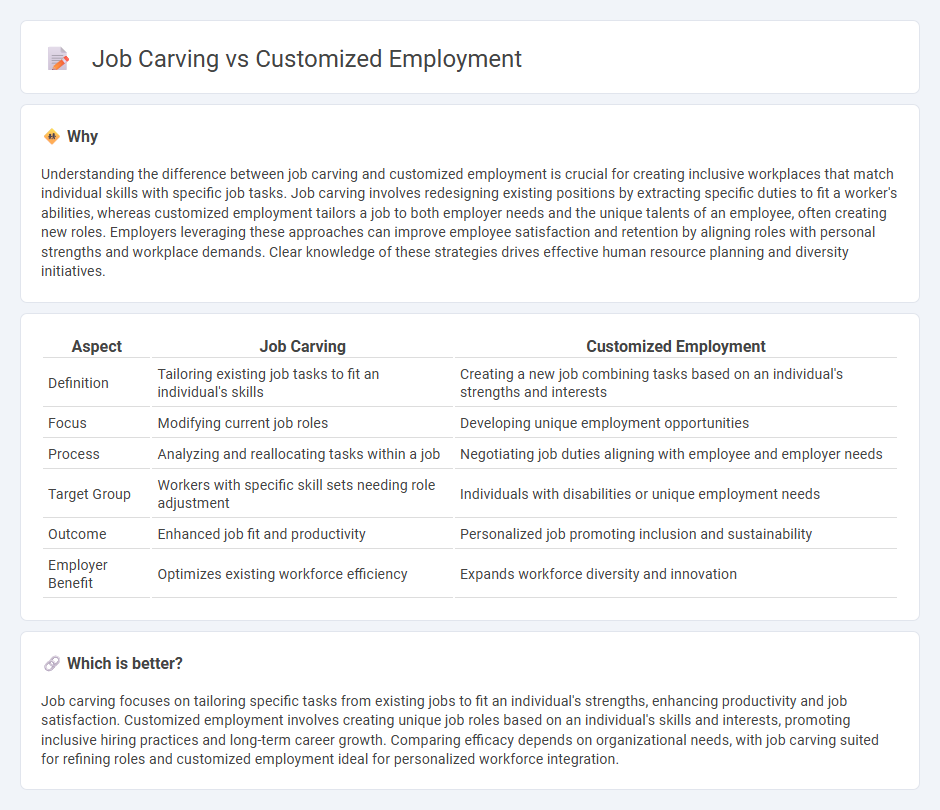
Job carving focuses on identifying specific tasks within existing job roles to create tailored positions that match an individual's strengths and abilities. Customized employment involves negotiating work arrangements with employers to design personalized job roles that accommodate unique skills and needs of employees. Explore how these innovative approaches transform employment opportunities for diverse talent.
Why it is important
Understanding the difference between job carving and customized employment is crucial for creating inclusive workplaces that match individual skills with specific job tasks. Job carving involves redesigning existing positions by extracting specific duties to fit a worker's abilities, whereas customized employment tailors a job to both employer needs and the unique talents of an employee, often creating new roles. Employers leveraging these approaches can improve employee satisfaction and retention by aligning roles with personal strengths and workplace demands. Clear knowledge of these strategies drives effective human resource planning and diversity initiatives.
Comparison Table
| Aspect | Job Carving | Customized Employment |
|---|---|---|
| Definition | Tailoring existing job tasks to fit an individual's skills | Creating a new job combining tasks based on an individual's strengths and interests |
| Focus | Modifying current job roles | Developing unique employment opportunities |
| Process | Analyzing and reallocating tasks within a job | Negotiating job duties aligning with employee and employer needs |
| Target Group | Workers with specific skill sets needing role adjustment | Individuals with disabilities or unique employment needs |
| Outcome | Enhanced job fit and productivity | Personalized job promoting inclusion and sustainability |
| Employer Benefit | Optimizes existing workforce efficiency | Expands workforce diversity and innovation |
Which is better?
Job carving focuses on tailoring specific tasks from existing jobs to fit an individual's strengths, enhancing productivity and job satisfaction. Customized employment involves creating unique job roles based on an individual's skills and interests, promoting inclusive hiring practices and long-term career growth. Comparing efficacy depends on organizational needs, with job carving suited for refining roles and customized employment ideal for personalized workforce integration.
Connection
Job carving and customized employment are connected through their focus on creating tailored job opportunities that align with an individual's unique skills and abilities. Both approaches aim to redesign existing job roles or craft new positions to accommodate diverse workforce needs, thereby enhancing employment access for people with disabilities or those facing barriers to traditional employment. This connection highlights a shift towards inclusive hiring practices that prioritize personalized work arrangements and maximize employee contributions.
Key Terms
Individualized Support
Customized employment tailors job roles specifically to fit the unique strengths and needs of individuals with disabilities, often emphasizing individualized support through targeted accommodations and flexible work conditions. Job carving concentrates on reshaping existing job tasks to create a distinct position that leverages an individual's skills, optimizing productivity while fostering inclusion. Explore how these approaches enhance workforce diversity and empower employees by learning more about individualized support strategies.
Task Analysis
Customized employment and job carving both utilize task analysis to tailor roles to individual strengths and needs. Task analysis breaks down job duties into specific tasks, enabling the identification of suitable components for customization or carving out to fit employee capabilities. Explore how task analysis drives effective employment strategies to enhance workplace inclusion and productivity.
Employer Negotiation
Customized employment involves tailoring job roles to fit the skills of a candidate, often requiring in-depth employer negotiation to align business needs with employee abilities. Job carving specifically breaks down existing roles into smaller tasks, negotiating with employers to match these tailored duties to individual workers. Explore how strategic employer negotiation can enhance workforce inclusion and productivity.
Source and External Links
Customized employment - Customized employment personalizes the job relationship by tailoring job content and environment to an individual's skills, interests, and needs, particularly supporting employees with disabilities to promote community inclusion and self-determination.
Customized Employment - Minnesota.gov - Customized employment is an interest-based negotiation between a job seeker and employer that matches an individual's skills and preferences with specific workforce needs, using a person-centered discovery process to develop tailored job duties.
Discovery & Customized Employment - Customized employment is a federally recognized approach under WIOA that individually matches job seekers' strengths and conditions with employer needs, enhancing job satisfaction and retention for people with disabilities and diverse populations.
 dowidth.com
dowidth.com